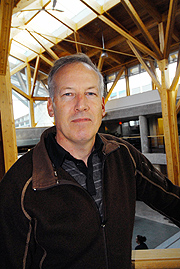UNBC Receives Funding to Research Best Uses for Pine Beetle-Infested Wood
October 27, 2011
A research project at the University of Northern British Columbia (UNBC) will be receiving $100,000 to study the best uses for stands of timber killed by the mountain pine beetle. The project, led by UNBC Ecosystem Science and Management professor Art Fredeen, involves researchers from UNBC, UBC, and the Canadian Centre for Policy Alternatives. The research aims to assist policy-makers and forest-users in achieving the best balance when utilizing BC's forest resource. Specifically, it attempts to increase understanding of when and where it makes sense to harvest beetle-attacked forests. The award--to be split over two years--is part of $450,000 in new research funding announced by the Pacific Institute for Climate Solutions (PICS). The goal is to aid studies on the impact of climate change on the province's forests and find more sustainable management practices. "Many parties, including the BC government, independent power producers, and the forestry industry, have advocated for the production of energy from wood, driven largely by the mountain pine beetle outbreak and the fate of an estimated 675 million cubic metres of pine in the province," says Dr. Fredeen. "However, new research indicates that these attacked pine stands are far from lifeless, and in many cases are already carbon sinks, in addition to their providing quality lumber and bioenergy fuel." A carbon sink is a reservoir that accumulates and stores carbon-containing chemical compounds for an extended period. The process by which carbon sinks remove carbon dioxide from the atmosphere is known as carbon sequestration, which is often promoted for use as a form of carbon offset to mitigate the effects of climate change. "Global warming hangs like a sword over BC's forests and dealing with it presents a big challenge," says PICS Executive Director Dr. Tom Pedersen. "PICS is very pleased to support collaborative research between and among our leading universities, industry, and federal research labs that will improve long-term stewardship of our remarkable forest resource." Almost 17.5 million hectares of BC's forested areas are currently affected by the mountain pine beetle outbreak. As the beetle-killed wood decomposes or burns, it releases carbon dioxide into the atmosphere, thus contributing to global warming. PICS is a collaboration of BC's four-research intensive universities-the University of Victoria (UVic), University of British Columbia (UBC), Simon Fraser University (SFU), and UNBC-hosted and led by UVic. |

